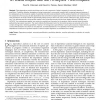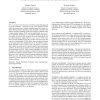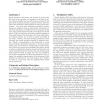56 search results - page 8 / 12 » Using strategies for assessment of programming exercises |
IPPS
2005
IEEE
15 years 5 months ago
2005
IEEE
In 2002, Japan announced the Earth Simulator—a supercomputer based on low-volume vector processors and a custom network—and reported that computational scientists had used it ...
ICS
1993
Tsinghua U.
15 years 3 months ago
1993
Tsinghua U.
—Data dependence analysis techniques are the main component of today’s strategies for automatic detection of parallelism. Parallelism detection strategies are being incorporate...
104
click to vote
HRI
2006
ACM
15 years 5 months ago
2006
ACM
Programming robots to carry out useful tasks is both a complex and non-trivial exercise. A simple and intuitive method to allow humans to train and shape robot behaviour is clearl...
PEPM
2007
ACM
15 years 5 months ago
2007
ACM
Poly-Controlled Partial Evaluation (PCPE) is a powerful approach to partial evaluation, which has recently been proposed. PCPE takes into account sets of control strategies instea...
CF
2005
ACM
15 years 1 months ago
2005
ACM
Result checking is the theory and practice of proving that the result of an execution of a program on an input is correct. Result checking has most often been envisioned in the fr...



